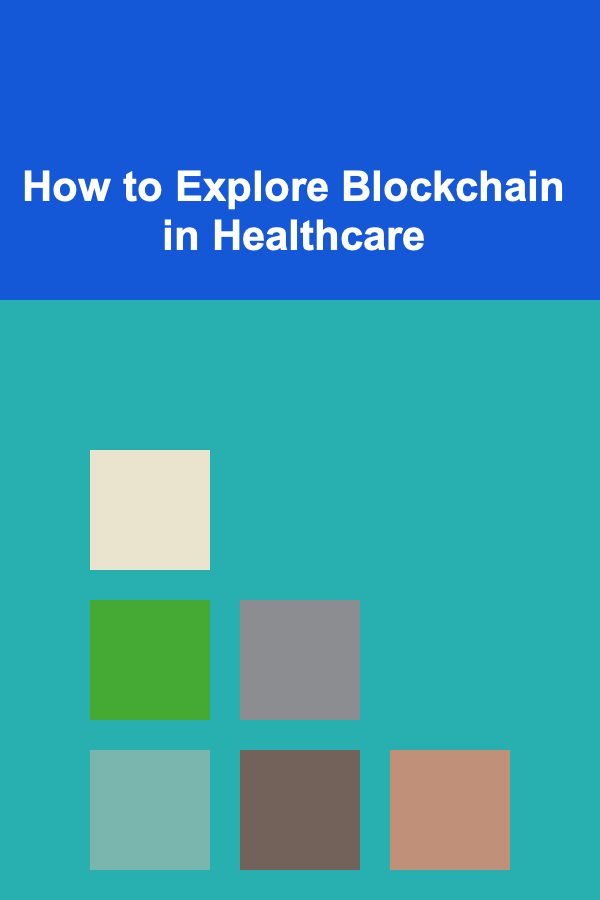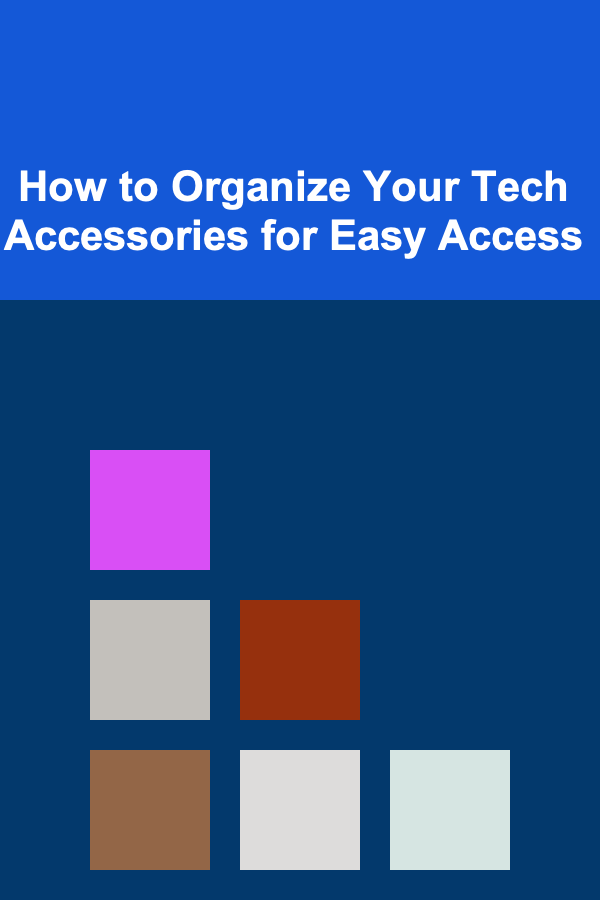
How to Explore Blockchain in Healthcare
ebook include PDF & Audio bundle (Micro Guide)
$12.99$8.99
Limited Time Offer! Order within the next:

Blockchain technology has emerged as one of the most revolutionary innovations in the digital world, offering significant potential across various industries. One such sector that stands to benefit greatly from the application of blockchain is healthcare. With the growing complexity of healthcare systems worldwide, the need for improved data management, enhanced security, and streamlined processes is greater than ever. Blockchain provides an innovative solution to many of the challenges faced by the healthcare industry today.
In this article, we will explore the potential of blockchain in healthcare, focusing on its key applications, benefits, challenges, and how it can be integrated into existing healthcare infrastructures. By understanding the fundamental principles behind blockchain technology and its potential use cases in healthcare, we can better grasp how it could reshape the future of this industry.
Understanding Blockchain Technology
Before delving into its application in healthcare, it's essential to understand what blockchain is and how it works. At its core, blockchain is a decentralized, distributed ledger technology that records transactions across multiple computers in a secure and transparent manner. Unlike traditional databases, where data is stored centrally, blockchain distributes data across a network of nodes, ensuring that no single entity has full control over the data.
The main features of blockchain include:
- Decentralization: Data is stored across a distributed network, reducing the risk of single points of failure and improving security.
- Transparency: Transactions on the blockchain are visible to all participants, ensuring that data is easily auditable and verifiable.
- Immutability: Once data is recorded on the blockchain, it cannot be altered or deleted, ensuring the integrity of the information.
- Security: Blockchain uses cryptographic techniques to secure data, making it highly resistant to tampering and hacking.
These characteristics make blockchain particularly suitable for industries where data integrity, privacy, and security are paramount, such as healthcare.
Key Applications of Blockchain in Healthcare
Blockchain technology offers a wide range of potential applications in healthcare. From improving patient data management to enabling secure and transparent supply chains, blockchain can address several pain points in the healthcare sector. Below are some of the most promising use cases:
1. Patient Data Management
One of the most significant challenges in healthcare is the management and sharing of patient data. Healthcare data is often siloed in different systems across various healthcare providers, which can lead to inefficiencies, errors, and delays in patient care. Blockchain can help solve this issue by providing a secure, interoperable platform for storing and sharing patient records.
With blockchain, patients can have control over their own health data, granting access to authorized healthcare providers and ensuring that only relevant parties can view sensitive medical information. This can help create a more patient-centered model, where individuals can easily share their health records across different institutions, improving the continuity of care.
Additionally, blockchain can streamline the process of updating patient records, ensuring that all data changes are recorded in a transparent and immutable way. This reduces the risk of errors and ensures that healthcare providers are working with the most up-to-date information.
2. Supply Chain Management
The pharmaceutical supply chain is notoriously complex and prone to fraud. Counterfeit drugs, theft, and substandard products can have serious consequences for patient safety. Blockchain offers a solution by providing a transparent and immutable ledger that tracks every step of a drug's journey from manufacturing to delivery.
By recording each transaction on the blockchain, healthcare providers can verify the authenticity of pharmaceutical products and ensure that drugs are safe for consumption. This also makes it easier to track the movement of medical supplies, reducing waste and improving efficiency.
Blockchain-based supply chain systems can also enhance accountability, as every participant in the chain, from manufacturers to distributors, can be held responsible for their role in the process. This transparency can help prevent fraud and ensure that patients receive high-quality medications.
3. Clinical Trials and Research
Clinical trials are a critical part of the drug development process, but they often face challenges related to data integrity, transparency, and patient recruitment. Blockchain can address many of these challenges by providing a secure and transparent platform for conducting clinical trials.
One of the key benefits of using blockchain in clinical trials is the ability to record data in an immutable way. This ensures that trial data cannot be altered or manipulated, providing a trustworthy record of the trial's progress and results. Additionally, blockchain can improve the recruitment process by enabling secure, transparent communication between researchers and potential participants.
Blockchain can also streamline the sharing of research data between institutions, ensuring that researchers can collaborate more easily while maintaining the privacy and security of sensitive information. This can accelerate the development of new treatments and therapies, benefiting patients worldwide.
4. Smart Contracts for Healthcare Transactions
Smart contracts are self-executing contracts with the terms of the agreement directly written into code. In healthcare, smart contracts can automate various processes, such as billing, insurance claims, and payment settlements.
For example, when a patient receives a medical service, a smart contract can automatically trigger payment from the insurer, ensuring that the provider is paid promptly and without the need for intermediaries. This can reduce administrative overhead, streamline billing processes, and improve the efficiency of insurance claims processing.
Smart contracts can also be used to automate the execution of healthcare-related agreements, such as agreements between healthcare providers, insurers, and pharmaceutical companies. By removing intermediaries and automating processes, smart contracts can reduce costs and enhance trust between parties.
5. Telemedicine and Remote Healthcare Services
Telemedicine has become increasingly popular in recent years, offering patients access to healthcare services remotely. Blockchain can enhance telemedicine platforms by providing a secure and transparent way to store and share patient data.
With blockchain, telemedicine providers can ensure that patient information is securely stored and transmitted, reducing the risk of data breaches and unauthorized access. Blockchain can also improve the verification process for healthcare professionals, ensuring that only licensed and qualified practitioners can provide remote services.
Furthermore, blockchain-based payment systems can facilitate secure transactions between patients and healthcare providers, ensuring that both parties are protected from fraud.
Benefits of Blockchain in Healthcare
The integration of blockchain in healthcare offers a multitude of benefits that can transform the industry. Some of the key advantages include:
1. Enhanced Data Security and Privacy
Blockchain's decentralized nature and cryptographic security features make it an ideal solution for protecting sensitive healthcare data. By eliminating the need for a central repository, blockchain reduces the risk of data breaches and cyberattacks. Furthermore, blockchain ensures that only authorized parties can access patient data, enhancing privacy and security.
2. Improved Interoperability
Healthcare systems are often fragmented, with data stored in different formats and across various platforms. Blockchain can enable interoperability by providing a standardized, decentralized platform for sharing and accessing data. This can improve the efficiency of healthcare delivery and reduce the risk of errors due to incomplete or outdated information.
3. Cost Reduction
Blockchain can reduce costs by eliminating intermediaries and streamlining processes. For example, smart contracts can automate billing and payment processes, reducing administrative overhead. Additionally, blockchain's transparency can help prevent fraud and waste in the healthcare supply chain, leading to cost savings for healthcare providers and patients alike.
4. Increased Transparency and Accountability
Blockchain's transparent nature allows all participants in the system to view and verify transactions. This can increase accountability in healthcare, particularly in areas such as clinical trials, supply chain management, and insurance claims processing. By providing an immutable record of transactions, blockchain can help prevent fraud, errors, and misconduct.
5. Faster and More Efficient Processes
Blockchain can streamline many healthcare processes, such as patient data management, insurance claims processing, and drug supply chain tracking. By automating tasks and reducing the need for intermediaries, blockchain can improve the speed and efficiency of these processes, ultimately leading to better patient outcomes and lower costs.
Challenges of Implementing Blockchain in Healthcare
While blockchain offers significant potential in healthcare, there are also several challenges to its implementation:
1. Regulatory and Legal Issues
The healthcare industry is heavily regulated, and the use of blockchain in this context may raise legal and regulatory concerns. For example, how will blockchain-based healthcare records comply with data privacy regulations, such as HIPAA in the United States or GDPR in Europe? Clear guidelines and standards need to be established to ensure that blockchain solutions meet regulatory requirements.
2. Scalability and Integration with Existing Systems
Healthcare systems are complex and often involve legacy infrastructure. Integrating blockchain with existing systems can be challenging, particularly when it comes to ensuring interoperability between blockchain networks and traditional healthcare IT systems.
Furthermore, blockchain networks can face scalability issues, especially when dealing with large volumes of data. Ensuring that blockchain solutions can scale to meet the demands of the healthcare industry is a key challenge that must be addressed.
3. Adoption and Acceptance
The adoption of blockchain in healthcare will require buy-in from a wide range of stakeholders, including healthcare providers, insurers, pharmaceutical companies, and patients. Resistance to change, lack of understanding, and concerns about data privacy and security may hinder the widespread adoption of blockchain solutions.
4. Cost of Implementation
Implementing blockchain solutions can be expensive, particularly for healthcare organizations that are already struggling with budget constraints. The initial investment in technology, training, and infrastructure can be a barrier to adoption for many organizations, especially smaller providers.
Conclusion
Blockchain has the potential to transform the healthcare industry by improving data security, enhancing interoperability, reducing costs, and increasing transparency. From patient data management to supply chain optimization and clinical trials, blockchain offers a wide range of applications that can enhance the efficiency and effectiveness of healthcare systems worldwide.
However, the successful implementation of blockchain in healthcare will require overcoming several challenges, including regulatory hurdles, scalability issues, and resistance to change. By addressing these obstacles and working collaboratively across the healthcare sector, blockchain can play a key role in shaping the future of healthcare, improving patient outcomes, and driving innovation in the industry.
As the technology continues to evolve, it will be crucial for stakeholders to explore and experiment with blockchain solutions to unlock its full potential in healthcare. Through careful planning, investment, and collaboration, blockchain can revolutionize the way we deliver and receive healthcare, paving the way for a more efficient, secure, and patient-centric healthcare system.

How to Make Your Rental Property More Attractive to Families
Read More
How to Organize Your Tech Accessories for Easy Access
Read More
How to Plan a Budget-Friendly Home Renovation
Read More
Mastering Efficient Meal Prepping Techniques for a Stress-Free Week
Read More
How To Master Video Compression
Read More
How to Knit a Fair Isle Hat: A Complete Checklist
Read MoreOther Products

How to Make Your Rental Property More Attractive to Families
Read More
How to Organize Your Tech Accessories for Easy Access
Read More
How to Plan a Budget-Friendly Home Renovation
Read More
Mastering Efficient Meal Prepping Techniques for a Stress-Free Week
Read More
How To Master Video Compression
Read More